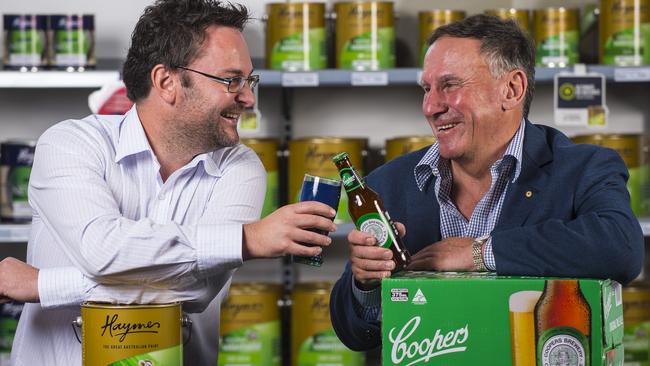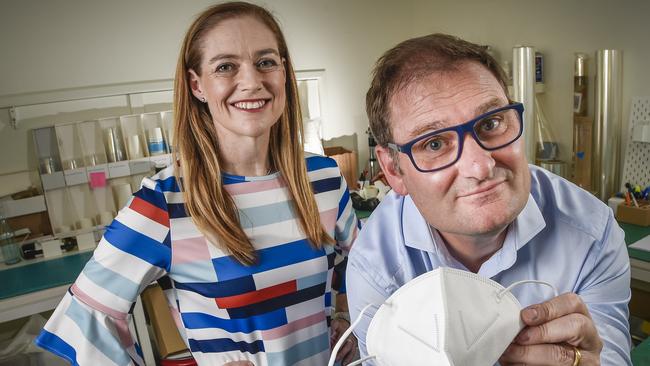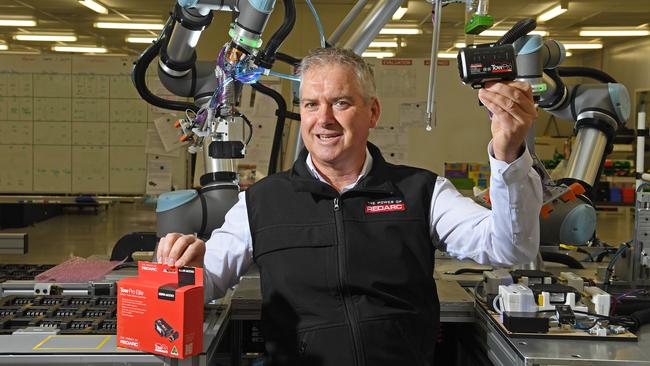Energy rebates, wage caps and changes to trade deals are crucial to bolstering the ‘buy Australian’ message, Glenn Cooper says
There’s a big push to buy Australian amid the COVID-19 crisis. But without key policy measures we might waste this great opportunity, says beer baron Glenn Cooper. TAKE OUR POLL
SA Business
Don't miss out on the headlines from SA Business. Followed categories will be added to My News.
- Where SA’s small businesses should turn for help
- How to get the most out of your Advertiser digital subscription
Energy rebates for Australian manufacturers and wage deals capped at CPI must be considered to ensure the potential of the current push to “buy Australian” is successful, Glenn Cooper, who chairs the Australian Made campaign says.
Australian Made this week kicked off a national campaign with the message “It’s never been more important to buy Australian than right now’’.
Mr Cooper said the coronavirus epidemic had thrown into stark relief the nation’s reliance on overseas imports and the fragility of some of those supply lines.
There had been a strong surge of support to “buy local”, Mr Cooper said, but there was a fear, also expressed by former Victorian premier Jeff Kennett recently, that as things return to normal, shoppers and businesses will revert to buying based on price rather than sticking with Australian brands.

Mr Cooper, former head of marketing and now chairman of Coopers Brewery, who also sits on the boards of Haymes Paint and Bundaberg Ginger Beer, said applications to use the Australian Made logo were up more than five-fold since January, but more had to be done to capitalise on that momentum.
“There’s a bit of euphoria at the moment saying it’s great for Australian products, but there are a few hurdles that need to be overcome,’’ Mr Cooper said.
“Number one is power and energy. The government needs to give a rebate for energy to all manufacturers.
“If you’re a start-up manufacturer or you’re growing, or you’re going to a new production line I don’t think it’s a massive amount of money to assist with a rebate.’’
Mr Cooper said unions also needed to work with employers and suggested that pay rises be held to CPI, or the rate of inflation.
“Or again, there’s a government rebate for the CPI increase.’’
Mr Cooper said Detmold was a perfect example – the Adelaide-based manufacturer of packaging materials which had pivoted to making face masks, albeit with $1.5 million in State Government assistance.
Detmold has been contracted to supply 145 million face masks to the state and federal governments.

Looking internationally, Mr Cooper said Australia had telegraphed its desire over many years to strike free trade agreements, which led to an imbalance in negotiating clout.
“The politicians have to slow up on that. Let the free trade agreements be negotiated correctly,’’ he said.
There was also advice from the Department of Foreign Affairs and Trade, based on World Trade Organisation advice, that Australian companies should not say their product was “better” than imported products, he said.
To follow this advice was just “ridiculous’’, Mr Cooper added.
Lonsdale automotive electronics firm Redarc Electronics, which specialises in high-end energy management systems for 4WDs, trucks and other outdoor vehicles has found that selling “Australian made” in its push into the US market has been a winner.
Chief executive Anthony Kittel said the “overlanding” market – the term used for 4WD adventurers in the US – believed that goods made to suit the harsh Australian environment would survive anywhere.
“What we’re finding is that it’s very positive and they really rate our Australian-made product against US and other players,’’ Mr Kittel said.
“Their views are that if you can make it survive in the outback it can survive anywhere.’’

Mr Kittel said online sales to the US had grown by 100 per cent last month.
The company has also signed a lucrative contract in France, where Mr Kittel said there was more of a journey to convince buyers that Australia was a higher quality manufacturer perhaps than other parts of our region.
“People are starting to see that product made in Australia is really good stuff,’’ he said.
“If you buy Redarc, you buy it once.’’
Mr Cooper said the Australian Made logo and advertising thrust were member-funded, with only modest government support for overseas export marketing.
Mr Cooper said applications to join the organisation had jumped from about 60 a month usually to more than 300 last month.

